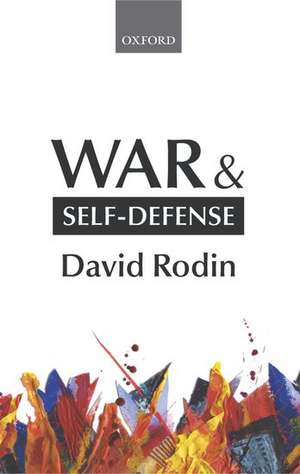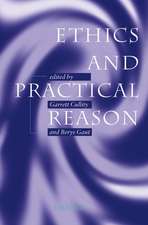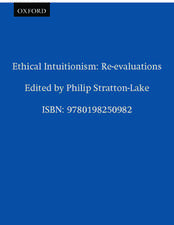War and Self-Defense
Autor David Rodinen Limba Engleză Paperback – 25 noi 2004
| Toate formatele și edițiile | Preț | Express |
|---|---|---|
| Paperback (1) | 293.36 lei 31-37 zile | |
| OUP OXFORD – 25 noi 2004 | 293.36 lei 31-37 zile | |
| Hardback (1) | 315.56 lei 31-37 zile | |
| OUP OXFORD – 17 oct 2002 | 315.56 lei 31-37 zile |
Preț: 293.36 lei
Preț vechi: 360.09 lei
-19% Nou
Puncte Express: 440
Preț estimativ în valută:
56.15€ • 58.39$ • 46.98£
56.15€ • 58.39$ • 46.98£
Carte tipărită la comandă
Livrare economică 04-10 martie
Preluare comenzi: 021 569.72.76
Specificații
ISBN-13: 9780199275410
ISBN-10: 0199275416
Pagini: 230
Dimensiuni: 138 x 215 x 13 mm
Greutate: 0.29 kg
Editura: OUP OXFORD
Colecția OUP Oxford
Locul publicării:Oxford, United Kingdom
ISBN-10: 0199275416
Pagini: 230
Dimensiuni: 138 x 215 x 13 mm
Greutate: 0.29 kg
Editura: OUP OXFORD
Colecția OUP Oxford
Locul publicării:Oxford, United Kingdom
Recenzii
required reading for anyone with a reflective interest in these issues. It is clearly and shrewdly argued throughout, insightful, provocative, and elegantly written.
Rodin's discussion of war and of self-defence seeks to drive a wedge between the two ideas. The first part of the book presents a robust account of the moral justification for killing in self-defence. The second part argues, convincingly in my view, that waging war cannot be morally justified as a form of self-defence.
his critique of the rights-based theory of war as self-defence should be required reading for anyone concerned with questions about the morality of war. And in the current state of the world, that ought to mean everyone.
Nothing could be more timely . . . than a careful reconsideration of the relation between war and the self-defense of citizens. David Rodin's War and Self-Defense is everything such a book should be: a careful and learned exploration of the topic that resolves some long-standing issues while raising new questions and advancing new proposals for how to think about war. "A dispiriting level of confusion is often evident in both popular and philosophical-legal thought on the justice of war," he remarks midway through his study (p. 126). Rodin's is just the sort of work we need to address this problem. It will be a starting point for discussion of these topics in the future.
illuminating and provocative
In War and Self-Defense David Rodin uncovers many flaws of current thinking about war. Rodin correctly points out that the justification of national self-defense goes beyond the justification of individual self-defense. He accurately rejects the standard notion of moral symmetry--the accepted view that both just and unjust warriors can permissibly kill enemies as long as they observe the laws of war. Rodin vindicates the right view: if a war is unjust, each and every injury caused by the unjust warrior is a criminal act. There are no morally justified killings by those who fight unjust wars. Further, Rodin rightly rejects various holistic theories of self-defense. Last but not least, he correctly denounces . . . the idea that tyrannical governments are worth defending against interventions aimed at deposing them because they are protected by the principle of sovereignty.
Rodin's discussion of war and of self-defence seeks to drive a wedge between the two ideas. The first part of the book presents a robust account of the moral justification for killing in self-defence. The second part argues, convincingly in my view, that waging war cannot be morally justified as a form of self-defence.
his critique of the rights-based theory of war as self-defence should be required reading for anyone concerned with questions about the morality of war. And in the current state of the world, that ought to mean everyone.
Nothing could be more timely . . . than a careful reconsideration of the relation between war and the self-defense of citizens. David Rodin's War and Self-Defense is everything such a book should be: a careful and learned exploration of the topic that resolves some long-standing issues while raising new questions and advancing new proposals for how to think about war. "A dispiriting level of confusion is often evident in both popular and philosophical-legal thought on the justice of war," he remarks midway through his study (p. 126). Rodin's is just the sort of work we need to address this problem. It will be a starting point for discussion of these topics in the future.
illuminating and provocative
In War and Self-Defense David Rodin uncovers many flaws of current thinking about war. Rodin correctly points out that the justification of national self-defense goes beyond the justification of individual self-defense. He accurately rejects the standard notion of moral symmetry--the accepted view that both just and unjust warriors can permissibly kill enemies as long as they observe the laws of war. Rodin vindicates the right view: if a war is unjust, each and every injury caused by the unjust warrior is a criminal act. There are no morally justified killings by those who fight unjust wars. Further, Rodin rightly rejects various holistic theories of self-defense. Last but not least, he correctly denounces . . . the idea that tyrannical governments are worth defending against interventions aimed at deposing them because they are protected by the principle of sovereignty.
















